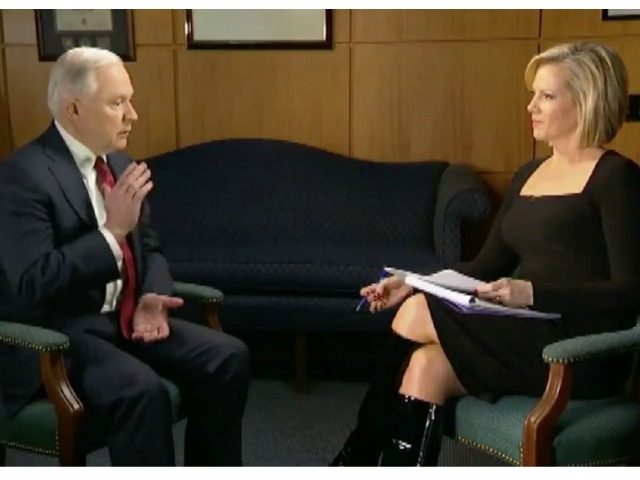Attorney General Jeff Sessions appointed prosecutors in 2017 to investigate matters Congress referred to the U.S. Department of Justice (DOJ) as growing scandals possibly involved criminal activities.
These prosecutors will report directly back to Sessions, who told Fox News on Wednesday night that he will then decide whether a second special prosecutor is necessary to take these matters to court.
Critics of the attorney general have said he needs to look into matters where there are suspicions that crimes may have been committed, such as the growing scandal regarding Foreign Intelligence Surveillance Act (FISA) search warrants to spy on members of President Trump’s campaign and transition team in 2016. Emerging evidence suggests this surveillance continued after the presidential election.
He is doing exactly that, Sessions told Shannon Bream during an interview Wednesday. The attorney general has appointed a prosecutor with “many years in the Department of Justice” to investigate these things, and will “consider seriously” appointing a second special counsel to possibly bring criminal charges.
Sessions initially recused himself from the question of Russian interference in the 2016 election, but has repeatedly let the public know that he is fully engaged as the head of DOJ regarding all other investigations.
Federal regulations found at 28 C.F.R. Part 600 provide that the attorney general can appoint a special counsel under certain circumstances. A special counsel is a prosecutor who can be fired by the president or the attorney general only for good cause. So long as he does not cross that line, a special counsel assembles his own team of investigators, runs his investigation in secret, makes his own decision as to whether to seek indictments from a grand jury or file criminal charges, and otherwise conducts his activities outside DOJ’s normal structure.
In order for a special counsel to be appropriate, there must be a suspicion that a federal crime has been committed, and the situation must present a conflict of interest for DOJ and the Federal Bureau of Investigation (FBI, which is a component agency of DOJ) to pursue the matter.
Both of those conditions must be met to go outside DOJ’s Criminal Division and standard processes. There must be a possible crime, not merely civil wrongdoing or intelligence gathering. There must also be some sort of conflict inside DOJ, otherwise the regular career prosecutors in the department and investigators in the FBI would handle it.
If the allegations are of waste, fraud, abuse, or misconduct by DOJ employees, then often the DOJ inspector general – who has a staff of 450 lawyers, investigators, and support personnel – will investigate first, and issue a report both to the attorney general and to Congress, including recommendations for criminal prosecutions.
On November 13, 2017, Sessions had Assistant Attorney General Stephen Boyd deliver a letter to House Judiciary Committee Chairman Bob Goodlatte (R-VA), in response to possible criminal wrongdoing uncovered by members of the committee.
In that letter, DOJ reminded the Judiciary Committee that on January 12, 2017, Inspector General Michael Horowitz informed Congress that he was investigating several matters, including possible FBI use of improper considerations to launch investigations.
DOJ’s letter also advised Congress that the committee’s discoveries had been forwarded to Horowitz so that he could broaden his current investigations if necessary to explore the troubling allegations committee members were raising.
The letter also informed Congress that Sessions had already appointed veteran prosecutors to look into other matters brought to the department’s attention, now believed to include possible abuse of FISA to improperly obtain search warrants to spy on people associated with then-candidate Donald Trump.
The letter explained:
These senior prosecutors will report directly to the Attorney General and Deputy Attorney General, as appropriate, and will make recommendations as to whether any matters not currently under investigation should be opened, whether any matters currently under investigation require additional resources, or whether any matters merit the appointment of a Special Counsel.
In other words, four months ago Sessions publicly informed Congress that he was looking into these matters with an eye to possibly appointing additional special prosecutors once he received these reports – but Congress, the media, and commentators either missed this public document or ignored it.
On March 7, Sessions reaffirmed his willingness to appoint another special counsel in an interview with Shannon Bream on Fox News at Night. He responded directly to congressional calls for a new special counsel.
“We’re going to seriously consider their recommendations,” he began. “I have appointed a person outside of Washington, [with] many years [of experience] in the Department of Justice, to look at all the allegations that the House Judiciary Committee sent to us,” the attorney general told Bream, “and we’re conducting that investigation.”
He added that “We have a responsibility to ensure the integrity of the FISA process,” and added that the inspector general is continuing his investigations – which began in 2017 – into additional matters, and then will report both to Sessions and to Congress.
“We must make sure [these investigations are] done properly, and we are going to do that,” the attorney general vowed.
After those reports and recommendations have been submitted to him, Sessions said he will decide what action to take, including possibly appointed a second special counsel to pursue criminal charges.
Ken Klukowski is senior legal editor for Breitbart News. Follow him on Twitter @kenklukowski.

COMMENTS
Please let us know if you're having issues with commenting.